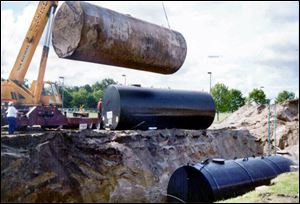
Underground tank cleanup pegged at $12B
2/23/2007
Leaking petroleum tanks pose a major threat to groundwater, the source of about half the nation's drinking water supply.
WASHINGTON - For years, Ohio and Michigan have sought ways to accelerate the cleanup of petroleum products leaking from underground storage tanks at gas stations and other fueling sites.
A Blade investigation last year pointed out how the petroleum products involved in the leaks contain benzene, toluene, and other substances known to cause cancer or other health problems.
The leaks also pose a major threat to groundwater, the source of about half the nation's drinking water supply.
Yesterday, the Government Accountability Office announced the most comprehensive figure to date on the cost of the problem nationwide: $12 billion.
And that, the GAO reported, would barely be enough to address 54,000 of the nation's 117,000 leaking underground storage tanks - 46 percent of the problem.
U.S. Rep. John Dingell (D., Dearborn), chairman of the House Committee on Energy and Commerce, yesterday said President Bush's proposal to release only $72.4 million of the surplus in the next fiscal year is one of a "gross inadequacy and disgraceful nature."
The Blade investigation also found Ohio has the nation's 11th worst backlog of leaking tanks, with nearly 3,500 confirmed releases. Almost 700 of those are in northwest Ohio, including more than 175 in Lucas County.
Things are even worse in Michigan, where the backlog of 9,082 cases is third in the nation behind Florida and California, and about 9,000 new leaks are found nationally each year.
The federal Leaking Underground Storage Tank Trust Fund, established in 1986, is holding a $2.5 billion surplus.
Its revenue comes from a tax of one-tenth of a penny collected on every gallon of gasoline, diesel, and other motor fuels sold in the United States.
The Sierra Club, in a 2005 report backed by the U.S. Environmental Protection Agency, said that surplus exists largely because of the bureaucracy involved in releasing money from it.
Records show allocations have hovered around the $70 million mark the past five years.
Mr. Dingell, the region's senior congressman, said that human health and the environment are placed "at an increased risk" by the administration's failure to accelerate cleanups.
Pete Chace, chief of Ohio's underground storage tank bureau, has said states could do a better job if Congress released at least as much or more than what the national fund accrues in interest each year. The fund is believed to generate $78 million to $100 million a year.
Mr. Chace didn't dispute the $12 billion estimate the GAO provided for 46 percent of the existing work.
Ed Hopkins, director of the Sierra Club's environmental quality program, said he believes the $12 billion figure is low.
He said it is "critically important" for states to enforce the GAO's top recommendation of having private tank owners maintain financial responsibility coverage.
The federal EPA, in written comments to the GAO, told the congressional investigators it took no issue with their findings and would work harder at holding private tank owners accountable.
Roxanne Smith, U.S. EPA spokesman, added in a statement to The Blade yesterday the agency plans to "aggressively work with state programs to prevent and clean up releases from underground storage tanks."
The GAO pegs the average cleanup cost at $125,000, although it has said that some jobs can exceed $1 million.
The agency's report said the financial toll on the public will be mitigated only if the oil industry makes good on its promise to pay for the cleanup of the other 63,000 tanks known to be leaking - something the GAO said is unlikely to happen.
Congressional investigators also found inconsistent requirements for state financial assurance funds. Such funds work like insurance policies to help support timely cleanups when owners and operators don't live up to their commitments.